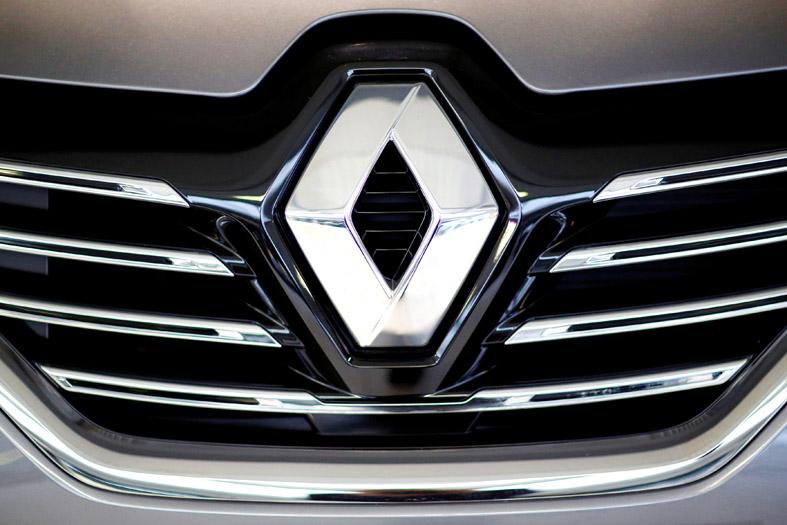French automaker Renault SA on Tuesday reported a sharp decrease in last year’s sales amid the COVID-19 pandemic, while unveiling its plans for a transition to electric and hydrogen-powered vehicles.
The group, which includes Japanese brands Nissan Motor Co and Mitsubishi Motors Corp, has suffered since it missed out on a tie-up with Fiat-Chrysler, and former chairman Carlos Ghosn was accused of financial misconduct by Japanese authorities.
Renault laid out a roadmap to recover the initiative after sales by volume slumped by 21.3 percent last year to 2.9 million vehicles in a market that was 14.2 percent lower overall.

Photo: Reuters
The fall was “principally due to the company’s large exposure to countries which imposed strict lockdowns ... in the second quarter, plus another slowdown in the fourth quarter, especially in France,” a Renault statement said.
For Europe as a whole, sales fell by 25.8 percent to 1.4 million units.
Hybrid and electric vehicles held up better than traditional vehicles in the second quarter, and in the last three months of the year, European orders in that segment were up by 14 percent from a year earlier, Renault said.
“From now on we will focus on profitability rather than sales volume, with unit margins being higher,” Renault chief executive Luca de Meo said.
Renault continued to dominate the European electric vehicle market last year, with sales of 115,888 vehicles, a gain of more than 101 percent.
Its small ZOE model accounted for the bulk of sales, with 100,000 vehicles.
The group plans several more electric versions, from its low-cost Dacia brand and remakes of its popular R5 and 4L models, to a higher-end vehicle developed with Nissan, a source close to the company said.
Another legacy brand, Alpine, might also be reinforced with two models, one of which could appeal to the sports-utility sector, the source said.
Hydrogen-fueled light commercial vehicles are also being developed after Renault announced plans to form a joint venture with US company Plug Power Inc, a leading developer of fuel cell systems.

China has claimed a breakthrough in developing homegrown chipmaking equipment, an important step in overcoming US sanctions designed to thwart Beijing’s semiconductor goals. State-linked organizations are advised to use a new laser-based immersion lithography machine with a resolution of 65 nanometers or better, the Chinese Ministry of Industry and Information Technology (MIIT) said in an announcement this month. Although the note does not specify the supplier, the spec marks a significant step up from the previous most advanced indigenous equipment — developed by Shanghai Micro Electronics Equipment Group Co (SMEE, 上海微電子) — which stood at about 90 nanometers. MIIT’s claimed advances last

ISSUES: Gogoro has been struggling with ballooning losses and was recently embroiled in alleged subsidy fraud, using Chinese-made components instead of locally made parts Gogoro Inc (睿能創意), the nation’s biggest electric scooter maker, yesterday said that its chairman and CEO Horace Luke (陸學森) has resigned amid chronic losses and probes into the company’s alleged involvement in subsidy fraud. The board of directors nominated Reuntex Group (潤泰集團) general counsel Tamon Tseng (曾夢達) as the company’s new chairman, Gogoro said in a statement. Ruentex is Gogoro’s biggest stakeholder. Gogoro Taiwan general manager Henry Chiang (姜家煒) is to serve as acting CEO during the interim period, the statement said. Luke’s departure came as a bombshell yesterday. As a company founder, he has played a key role in pushing for the

EUROPE ON HOLD: Among a flurry of announcements, Intel said it would postpone new factories in Germany and Poland, but remains committed to its US expansion Intel Corp chief executive officer Pat Gelsinger has landed Amazon.com Inc’s Amazon Web Services (AWS) as a customer for the company’s manufacturing business, potentially bringing work to new plants under construction in the US and boosting his efforts to turn around the embattled chipmaker. Intel and AWS are to coinvest in a custom semiconductor for artificial intelligence computing — what is known as a fabric chip — in a “multiyear, multibillion-dollar framework,” Intel said in a statement on Monday. The work would rely on Intel’s 18A process, an advanced chipmaking technology. Intel shares rose more than 8 percent in late trading after the

GLOBAL ECONOMY: Policymakers have a choice of a small 25 basis-point cut or a bold cut of 50 basis points, which would help the labor market, but might reignite inflation The US Federal Reserve is gearing up to announce its first interest rate cut in more than four years on Wednesday, with policymakers expected to debate how big a move to make less than two months before the US presidential election. Senior officials at the US central bank including Fed Chairman Jerome Powell have in recent weeks indicated that a rate cut is coming this month, as inflation eases toward the bank’s long-term target of two percent, and the labor market continues to cool. The Fed, which has a dual mandate from the US Congress to act independently to ensure